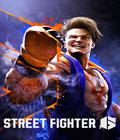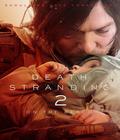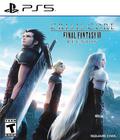Pre-order Crisis Core: Final Fantasy VII - Reunion
Final Fantasy VII is easily the mainline Final Fantasy title with the most spin-offs, with prequels, sequels, a dedicated movie, and even a short-lived battle royale title. In the wake of Final Fantasy VII Remake, the most important of these spin-offs was probably the PSP exclusive, Final Fantasy VII: Crisis Core. Unfortunately, "PSP exclusive" meant that the game has been unplayable for quite a few years. Thankfully, with Crisis Core: Final Fantasy VII - Reunion not far away, many players who previously missed this entry will finally get the chance to play it.
Reunion is set several years before the events of Final Fantasy VII. In it, you play as a plucky, spikey-haired soldier who wields the iconic Buster Sword. This isn't Cloud but Zack, a character whose importance to the overall narrative of FF7 can best be described as "a big spoiler." This adventure shows the origins of the Buster Sword and what much of the FF7 cast was up to prior to the events of the game, with more in-depth looks at Aerith, Cloud, Sephiroth and Tifa. Reunion is based around one of the biggest spoilers in FF7 — arguably bigger than the fate of a certain flower girl. At the same time, even Remake has given up the ghost on that particular spoiler, with Zack appearing near the end of the game in a way that only makes sense if you played Crisis Core. I'll try not to say anything more, but be prepared to know a lot more about the overall story than Remake showed.
Reunion was originally a PSP game, and that shows in its basic design. It has a linear narrative story that's broken up by bite-sized "missions" you can take on at any time, most of which involve quick battles against foes in a series of somewhat generic environments. Reunion changes a lot of the gameplay and mechanics, but at its core, it is the still the same PSP game that you might have played years ago. You shouldn't expect a Remake level of change. Crisis Core is somewhat closer to a heavy remaster, and as far as we're aware, there are no storyline changes from the original. That isn't necessarily a bad thing, though. Crisis Core might have handheld roots, but it has a lot going for it, especially with the changes we've seen thus far.
The most obvious changes to Reunion are to the combat system, and they're almost universally an improvement. The action-RPG combat in the original Crisis Core was built around the Digital Mind Wave (DMW), which was a constantly spinning roulette that paid out limit breaks, skill upgrades, and temporary bonuses. It's a neat mechanic that added some nice randomness to combat, but it had one giant fatal flaw: Every time it triggered a potential jackpot, it paused the gameplay until it played out. It was absolutely something that detracted from the flow of combat and was perhaps the most complained-about aspect of the game.
Reunion solves this in a lot of nice simple ways. For one thing, the DMW spins in the corner of the screen and never interrupts the gameplay. Even if you score a jackpot, which earns you a Limit Break, the Limit Break is no longer automatically executed on the spot but can be stored for use at a later time. The stocks only last until the end of the fight, but it means you won't have to sit through 20 seconds if you're only one sword strike away from killing a foe. It might sound like a small change, but it massively improves the combat system, which now feels smooth and seamless instead of running around and waiting for a limit break to trigger and interrupt the flow of combat.
This also applies to basic combat. All of the combat animations seem to have been redone, with Zack's attacks and general animations looking a lot more like Remake's Cloud. Your special skills and materia are now bound to individual buttons, similar to the quick select from that game. In combat, it now feels smooth and natural to swap between regular attacks and materia abilities, which the game strongly encourages. Using a yellow ability materia mid-combo actually boosts the damage of the attack, which rewards you for using them as a combo-ender. Magic used mid-combo comes out faster and makes Zack hop backward away from the enemy; it's a great way to avoid an enemy's attack and attack yourself at the same moment. Dodging and blocking both feel much smoother, and it was a lot easier to transition from combo to dodging and back again than in the PSP version.
Another very welcome change is the addition of a "break" meter, which pops up when enemies start to charge their most powerful attacks. In the original game, they were largely unavoidable and forced damage. In Reunion, the attacks seem to have been buffed slightly, but in exchange, you can lower the damage output by attacking while the enemy is charging. The more you drain their meter while they are charging, the weaker the final attack becomes. If you can reduce it to zero, you'll nullify the attack entirely. I love this change, as it again takes what was a forced "watch it happen" mechanic and returns control to the player. You can save limit breaks for a critical moment or use the smoother combo system to pile on damage.
Of course, it isn't just the gameplay that has changed. The entire game has been given a visual upgrade. It's not quite as fancy as Remake, but most of the important character models and locations have been given a noticeable glow-up that adds more detail and puts some designs in line with the Remake look. The game still uses mostly updated versions of the original FF7 layouts of locations. (Shinra Tower's lobby, for example, is a far more subdued affair than in Remake.)
Changes to lighting and coloring and a few other adjustments keep it feeling more like Remake's version of Midgar. There's enough shared art design between the two that I never felt like they were two different places, and the designers have done a good job at keeping a consistent look and feel between the two games. The game has also swapped over to the voice actors used in Remake dub instead of the original cast, which takes a bit of getting used to but keeps things consistent. It's also now fully voice-acted instead of only certain scenes.
Overall, Crisis Core: Final Fantasy VII - Reunion is shaping up to be an excellent port of the original title. From what we've played, it's still the same PSP game, but the changes to the combat systems and mechanics make it feel completely different. The gussied-up graphics and revamped voice acting help make it feel more in line with the aesthetics of Final Fantasy VII Remake, even if the layouts are different. Hopefully the full version lives up to what we saw in the opening chapters. Crisis Core: Final Fantasy VII - Reunion will hit pretty much every console and the PC on Dec. 13, 2022.
More articles about Crisis Core -Final Fantasy VII- Reunion











 Crisis Core -Final Fantasy VII- Reunion takes fans on an exciting journey through the origin of the FFVII saga in an all-new action-packed experience.
Crisis Core -Final Fantasy VII- Reunion takes fans on an exciting journey through the origin of the FFVII saga in an all-new action-packed experience.


























